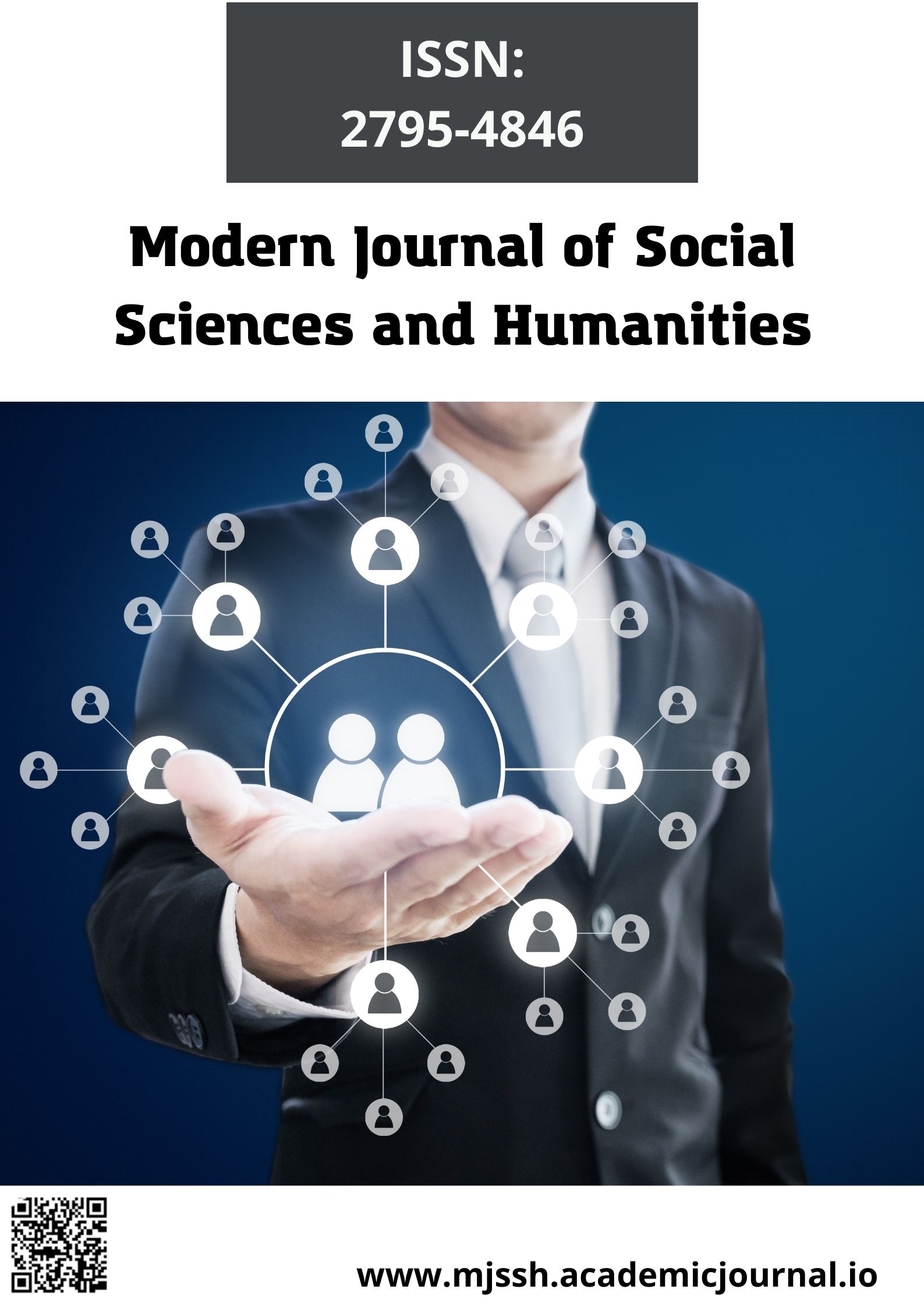Analysis of the Role of Online Transportation on Tourism Development
DOI:
https://doi.org/10.51699/mjssh.v1i7.602Keywords:
human rights, personality, society, state, reforms, social rights, natural rightsAbstract
The purpose of this study is to analyze whether the existence of online grab transportation in Kupang City has a positive impact on tourism development, in this study using interview techniques. The interview used was an unstructured interview, namely an independent interview in which the researcher did not use an interview guide that had been systematically structured. The sample in this study amounted to 15 respondents. The sampling technique used was random sampling. The data analysis technique used in this study is an interactive technique. Interactive technique is a data analysis technique that is carried out while in the field and after being in the field which is processed through four stages. The results of this study indicate that the presence of online transportation (Grab) in Kupang City can actually be used as a means of promotion and transportation that is comfortable and safe, as well as practical and efficient. Comfortable and safe from the condition of the vehicle and the driver, as well as practical and efficient from the operation of the application and the ease of finding the driver so that it can save time by visiting all tourist objects in Kupang City.
References
Afrizal, M. (2014). Metode penelitian kualitatif. Jakatra: PT Raja Grafindo Persada.
Ahmad Razimi, M. S. (2018). COMPREHENSIVE STRATEGY TO CONDUCT A MAIL SURVEY: TECHNIQUES TO IMPROVE RESPONSE RATES. COMPREHENSIVE STRATEGY TO CONDUCT A MAIL SURVEY: TECHNIQUES TO IMPROVE RESPONSE RATES, 8(4), 89-96.
Ali, B. S. (2015). Strategi Pengembangan Fasilitas Guna Meningkatkan Daya Tarik Minat Wisatawan Di Darajat Pass (Waterpark) Kecamatan Pasirwangi Kabupaten Garut. Universitas Pendidikan Indonesia.
Andriansyah, D. (2015). Manajemen Transportasi Dalam Kajian dan Teori. Jakarta: Pus. Fak. Ilmu Sos. dan Ilmu Polit. Univ. Prof. Dr. Moestopo Beragama.
Awaritefe, O., & Ejemeyovwi, D. O. (2019). Evaluating tourism potentials for site development tourism along River Ethiope, Abraka, Nigeria. Journal of Sustainable Tourism and Entrepreneurship, 1(2), 151-164.
Cudjoe, E., & Gbedemah, S. F. (2019). The new roles of Legon Botanical Garden as visitor destination in Ghana. Journal of Sustainable Tourism and Entrepreneurship, 1(1), 23-35.
da Conceição Walkowski, M., dos Santos Pires, P., & Tricárico, L. T. (2019). Community-based tourism initiatives and their contribution to sustainable local development. Journal of Sustainable Tourism and Entrepreneurship, 1(1), 55-67.
Diana, P., Suwena, I. K., & Wijaya, N. M. S. (2017). Peran Dan Pengembangan Industri Kreatif Dalam Mendukung Pariwisata Di Desa Mas Dan Desa Peliatan, Ubud. Jurnal Analisis Pariwisata ISSN, 1410, 3729.
Dionysopoulou, P. (2020). Agritourism entrepreneurship in Greece: policy framework, inhibitory factors and a roadmap for further development. Journal of Sustainable Tourism and Entrepreneurship, 2(1), 1-13.
Indrawati, K. A. P., Sudiarta, I. N., & Suardana, I. W. (2017). Efektivitas iklan melalui media sosial facebook dan instagram sebagai salah satu strategi pemasaran di krisna oleh-oleh khas Bali. Jurnal Analisis Pariwisata, 17(2), 78-83.
Ismayanti, I. (2010). Pengantar pariwisata. PT Gramedia Widisarana.
Karyono, A. H. (1997). Kepariwisataan. Jakarta: Grasindo, 492.
Kasim, A., Besie, J. L., & Nyoko, A. E. (2017). Strategi Promosi Pariwisata Kota Kupang melalui Pembuatan Media Katalog Wisata. Journal of Management Small and Medium Enterprises (SMEs), 4(1), 71-90.
Poli, S., Purwanto, F., & Sugiharto, T. (2015). Analisa Kebersihan Fasilitas Kapal Terhadap Tingkat Kepuasan Penumpang di KM. Binaiya PT. Pelayaran Nasional Indonesia (PELNI).
Pratama, G. Y., & Suradi, A. (2016). Perlindungan Hukum Terhadap Data Pribadi Pengguna Jasa Transportasi Online Dari Tindakan Penyalahgunaan Pihak Penyedia Jasa Berdasarkan Undang-Undang Nomor 8 Tahun 1999 Tentang Perlindungan Konsumen. Diponegoro Law Journal, 5(3), 1-19.
Ranasinghe, R., Kumudulali, U., & Ranaweera, A. (2019). The role of park attributes in visitor satisfaction: Evidence from Minneriya National Park in Sri Lanka. Journal of Sustainable Tourism and Entrepreneurship (JoSTE), 1(1), 87-104.
Rangkuti, F. (2006). Analisis swot teknik membedah kasus bisnis: reorientasi konsep perencanaan strategis untuk menghadapi abad 21.
Sanam, S. R., & Adikampana, I. M. (2014). Pengembangan Potensi Wisata Pantai Lasiana Sebagai Pariwisata Berkelanjutan di Kota Kupang, Provinsi Nusa Tenggara Timur. Jurnal Destinasi Pariwisata ISSN, 2338, 8811.
Setijowarno, D., & Frazila, R. B. (2001). Pengantar sistem transportasi. Semarang: Universitas Katolik Soegijapranata.
Sutanto, M. A., Riyanto, B., & Yuwono, E. C. (2013). Perancangan promosi untuk menunjang potensi wisata bahari Kepulauan Kangean, Kabupaten Sumenep, Jawa Timur. Jurnal DKV Adiwarna, 1(2), 20.
Suwantoro, G. (2019). Dasar-dasar pariwisata.
Taher, A. (2019). Implementasi Bauran Promosi Pariwisata Dalam Meningkatkan Jumlah Pengunjung Wisata Taman Rusa Sibreh Aceh Besar. Jurnal Ilmiah Mahasiswa Fakultas Ilmu Sosial & Ilmu Politik, 4(4).
Tiimub, B. M., Kuffour, R. A., Tiimob, R. W., Kuuyeni, C. A., Tiimob, E. L., & Tiimob, E. N. (2020). Sacred groves as potential ecotourism sites at Tolon and Diare in Northern Region, Ghana. Journal of Sustainable Tourism and Entrepreneurship, 1(3), 195-215.
Tumimomor, M., Jando, E., & Meolbatak, E. (2013). Sistem Informasi Geografis Pariwisata Kota Kupang. Jurnal Nasional Pendidikan Teknik Informatika: JANAPATI, 2(2), 142-152.
Wilopo, K. K., & Hakim, L. (2017). Strategi pengembangan destinasi pariwisata budaya (studi kasus pada kawasan situs Trowulan sebagai pariwisata budaya unggulan di Kabupaten Mojokerto). Jurnal Administrasi Bisnis (JAB), 41(1), 56-65.
Yeboah, T., Afram, C. S., Quampah, B., & Kulega, A. (2019). Adaptation to risks related to ecotourism: development at Boabeng in the Bono East Region, Ghana. Journal of Sustainable Tourism and Entrepreneurship, 1(2), 105-121.
Yoeti Oka, A. (1996). Pengantar Ilmu Pariwisata. Bandung: Angkasa.
Yuliana, Y. (2021). The strategy in increasing creative economy during the COVID-19 pandemic. Journal of Sustainable Tourism and Entrepreneurship, 2(2), 109-118.
Yuliansyah, Y. (2016). Meningkatkan Response Rate Pada Penelitian Survey Suatu Study Literature: Penerbit Change Publications.
Yuliari, G., & Riyadi, B. (2019). Bundling as strategy of tourist attraction based on natural and cultural tourism in the ex-Surakarta residency. Journal of Sustainable Tourism and Entrepreneurship, 1(1), 1-12.






